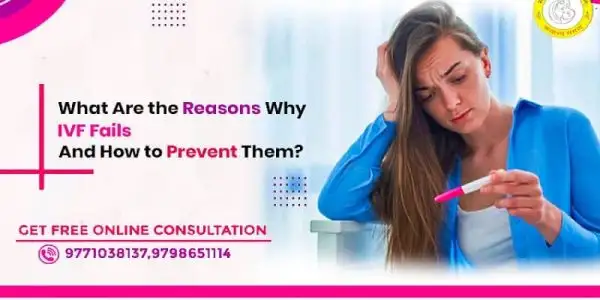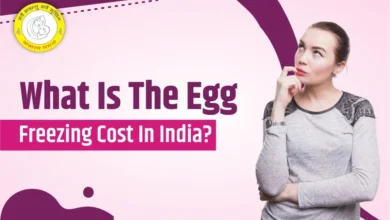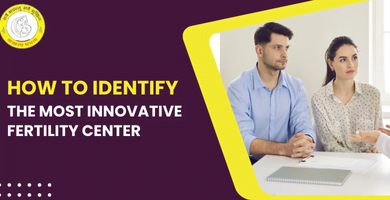Top Reasons Why IVF Fails & Tips to Boost Your Success Rate

Couples struggling to conceive turned to IVF treatment and successfully welcomed a child. Many consider IVF to be successful, but why IVF fails in some cases due to variables beyond control. This may cause one to question why IVF doesn’t work.
Understanding the IVF Process: A Step-by-Step Overview
In this Article
Having a greater grasp of how IVF works can help you prepare for a successful cycle. Show the IVF Process.
1. Ovarian Stimulation & Hormone Therapy
Every month, on average, one egg is released from the ovary. IVF, on the other hand, necessitates the extraction of several eggs from the uterus. In order to release numerous eggs at once and then remove them, follicle-stimulating hormones are administered.
2. Egg Retrieval Process
The best moment to extract eggs is when they have just been released from the follicles. It takes less than 30 minutes for the doctor to use an ultrasound to find the follicles in the ovary and a hollow needle to extract them.
3. Fertilization in the Lab
A donor or your partner’s sperm is used to fertilize the eggs as soon as they are removed from the uterus.
4. Embryo Development & Monitoring
To ensure proper growth and development, monitor the embryos (fertilized eggs) during their journey. Observe the embryos until they reach the advanced blastocyst stage, usually five days.
5. Embryo Transfer Procedure
In a quick and painless process, the best embryos are selected and transported to your uterus for eventual implantation. The doctor inserts a catheter into the uterus and places the embryos; the operation takes just a few minutes.
Top 5 Reasons Why IVF Fails & How to Address Them
1. Embryo Implantation Failure
A successful fertilization may fail if the embryo does not attach to the uterus and does not implant.
2. Poor Embryo Quality
In certain cases, physicians may not be able to discover a viable embryo during the IVF treatment. This necessitates the termination of the procedure.
3. Fertilization Challenges
It’s possible for the eggs to be fertilized even before an embryo is formed. This might be due to either one or both of them.
4. Low-Quality Eggs
In order for an embryo to develop correctly, high-quality eggs are required. The odds of forming an embryo are little to none if they aren’t gathered in sufficient numbers.
5. Unexplained IVF Failure
Hidden factors like mild endometriosis or genetic issues. Comprehensive testing (karyotyping, thrombophilia panels).
What to Do After IVF Failure: Medical and Emotional Next Steps
If you have an IVF failure, you’ll want to speak with your IVF Specialist Doctor in Patna to figure out what went wrong and what your next steps should be.
1. Consult Your Specialist for a Root Cause Analysis
The news of an unsuccessful IVF round may be upsetting on more than just a medical level for you and your spouse. As a consequence, this might lead to despair or fear about attempting it again. Counseling sessions might assist you in regaining some control over your emotions and a sense of well-being.
2. Lifestyle Adjustments to Boost Success
Lifestyle Changes When you talk to your doctor, you’ll have a better sense of what could have led to an unsuccessful in Vitro fertilization process. Pregnant women may be advised to adjust their diet and exercise routines in order to maintain their weight in a healthy range, as well as to increase the production of hormones that promote pregnancy.
3. Advanced Testing Options
If other methods of conceiving have failed, this may be an alternative. Genetic testing comes with a hefty price tag. In addition, it helps to identify any potential issues that can affect the embryo’s ability to implant, and repair or reduce them by selecting a suitable embryo.
Read the next article: Improve Your Fertility Levels
Coping with IVF Failure: Emotional Recovery Strategies
- Join Support Groups: Connect with others via RESOLVE or FertilityIQ.
- Self-Care Rituals: Prioritize sleep, hobbies, and therapy.
- Plan a Mental Health Break: Pause treatment to recharge emotionally.
Conclusion
IVF failure can feel devastating, but understanding why IVF fails equips you to refine your approach. Partner with a specialist to tailor your plan, prioritize emotional health, and stay hopeful. Explore advanced treatments and lifestyle tweaks—your path to parenthood may still be within reach.
FAQs
What happens to your body after failed IVF
After a failed IVF cycle, your body typically returns to its normal hormonal state. You will likely experience a period similar to a regular menstrual cycle. However, it’s essential to remember that everyone reacts differently, and some women may experience emotional and physical symptoms like fatigue, mood swings, or breast tenderness.
Why does IVF fail with good embryos
Even with good-quality embryos, IVF can fail due to various factors.
These include:
Uterine factors: Issues with the uterine lining, such as thinness or polyps, can hinder implantation.
Embryo implantation: The complex process of embryo implantation can be unpredictable.
Genetic abnormalities: Sometimes, even healthy-looking embryos may have genetic issues.
Unknown factors: In some cases, the reason for IVF failure remains unexplained.
3 failed IVF cycles what next
Experiencing multiple ivf fails cycles can be incredibly disheartening. It’s crucial to consult with your fertility specialist to explore potential next steps. These might include:
Comprehensive evaluation: Further testing to identify underlying issues.
Alternative treatments: Considering options like donor eggs, sperm, or embryos, or surrogacy.
Emotional support: Seeking counseling or support groups to cope with the emotional challenges.
Why IVF fails first time
The reason for IVF fails on the first attempt are similar to those for subsequent cycles. Factors such as egg quality, sperm quality, embryo development, uterine conditions, and unexplained infertility can all contribute to unsuccessful IVF.
IVF failure symptoms
While there are no specific physical symptoms for a failed IVF cycle, you may experience emotional symptoms like:
Sadness
Anger
Frustration
Anxiety
Depression
Depression after IVF Fails
It’s common to experience depression after multiple failed IVF attempts. The emotional toll can be significant. Seeking support from a mental health professional, joining support groups, or talking to loved ones can help you cope with these feelings.



